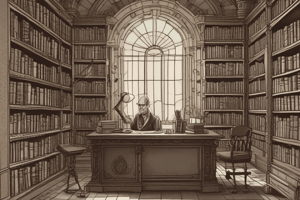Podcast
Questions and Answers
What is the primary purpose of evaluating library and information systems?
What is the primary purpose of evaluating library and information systems?
- To limit access to information resources.
- To assess the quality of services and meet user needs. (correct)
- To reduce the library budget.
- To justify staff reductions.
Library science primarily focuses on archiving historical documents and has limited relevance to modern technology.
Library science primarily focuses on archiving historical documents and has limited relevance to modern technology.
False (B)
Briefly describe the role of Melvil Dewey in the evolution of library science.
Briefly describe the role of Melvil Dewey in the evolution of library science.
Melvil Dewey founded the first school for library science at Columbia University in 1887, marking a significant step in the formalization of library education.
The term library and information science (LIS) is often used to emphasize the scientific and _________ foundations of the subject.
The term library and information science (LIS) is often used to emphasize the scientific and _________ foundations of the subject.
Match the following historical figures with their contributions to library science:
Match the following historical figures with their contributions to library science:
Which of the following best describes the relationship between library science and information science?
Which of the following best describes the relationship between library science and information science?
The Library of Alexandria is an example of a modern library with advanced digital resources.
The Library of Alexandria is an example of a modern library with advanced digital resources.
What was the significance of the 'Punjab Library Primer' in the context of library science history?
What was the significance of the 'Punjab Library Primer' in the context of library science history?
___________ advocated research using quantitative methods and ideas in the social sciences to address society’s information needs in librarianship.
___________ advocated research using quantitative methods and ideas in the social sciences to address society’s information needs in librarianship.
Match each activity with its corresponding role in evaluating library services
Match each activity with its corresponding role in evaluating library services
According to Michael Gorman's Five New Laws of Librarianship, what should be incorporated to allow for digital information to be considered?
According to Michael Gorman's Five New Laws of Librarianship, what should be incorporated to allow for digital information to be considered?
Periodicals are not a reliable source of information for current events.
Periodicals are not a reliable source of information for current events.
How did Thomas Jefferson's library contribute to the Library of Congress?
How did Thomas Jefferson's library contribute to the Library of Congress?
UNESCO defines a daily newspaper as one published at least _______ times a week.
UNESCO defines a daily newspaper as one published at least _______ times a week.
Match each type of periodical with its defining characteristic:
Match each type of periodical with its defining characteristic:
What is a key characteristic of periodicals regarding information currency?
What is a key characteristic of periodicals regarding information currency?
Evaluation of library services is not necessary if the library is meeting its budgetary goals.
Evaluation of library services is not necessary if the library is meeting its budgetary goals.
What are some of the advantages of using periodicals for research?
What are some of the advantages of using periodicals for research?
King _______ of Assyria assembled what is considered the first systematically collected library at Nineveh.
King _______ of Assyria assembled what is considered the first systematically collected library at Nineveh.
Match the following terms with their description:
Match the following terms with their description:
What is the main advantage of periodicals?
What is the main advantage of periodicals?
The first textbook on library science was published in the year 1929.
The first textbook on library science was published in the year 1929.
What is importance of library science?
What is importance of library science?
The Jefferson collection was the start of what we now know as the Library of _________
The Jefferson collection was the start of what we now know as the Library of _________
Match the following:
Match the following:
The University of Punjab, Lahore, Pakistan published the ‘library science’ book?
The University of Punjab, Lahore, Pakistan published the ‘library science’ book?
Periodical consists of a collection of articles.
Periodical consists of a collection of articles.
What do periodicals include?
What do periodicals include?
Academic courses in library science typically include collection management, information systems and technology, research methods, cataloging and classification_______.
Academic courses in library science typically include collection management, information systems and technology, research methods, cataloging and classification_______.
When was the first textbook in the United States published?
When was the first textbook in the United States published?
Journals and magazines are published weekly, once every two weeks every three months.
Journals and magazines are published weekly, once every two weeks every three months.
What are the chief characteristics of periodicals?
What are the chief characteristics of periodicals?
The legendary Library of _______ is perhaps the best known example of an early library, flourishing in the 3rd century BC and possibly inspired by Demetrius Phalereus.
The legendary Library of _______ is perhaps the best known example of an early library, flourishing in the 3rd century BC and possibly inspired by Demetrius Phalereus.
Flashcards
Evaluation (in library context)
Evaluation (in library context)
Assessing library services/activities, setting criteria to measure success.
Reasons for Performance Evaluation
Reasons for Performance Evaluation
To assess objectives' fulfillment or justify service continuation.
Library Science
Library Science
An interdisciplinary field applying management, IT, education to libraries.
Scope of Library Science
Scope of Library Science
Signup and view all the flashcards
Library and Information Science (LIS)
Library and Information Science (LIS)
Signup and view all the flashcards
Library Philosophy
Library Philosophy
Signup and view all the flashcards
First Systematically Collected Library
First Systematically Collected Library
Signup and view all the flashcards
Ancient Information Retrieval
Ancient Information Retrieval
Signup and view all the flashcards
Thomas Jefferson's Library
Thomas Jefferson's Library
Signup and view all the flashcards
First textbook on library science
First textbook on library science
Signup and view all the flashcards
First Use of Term 'Library Science'
First Use of Term 'Library Science'
Signup and view all the flashcards
Academic Courses in Library Science
Academic Courses in Library Science
Signup and view all the flashcards
Michael Gorman's Five New Laws
Michael Gorman's Five New Laws
Signup and view all the flashcards
Library Evaluation Objectives
Library Evaluation Objectives
Signup and view all the flashcards
Online Surveys and Focus Groups
Online Surveys and Focus Groups
Signup and view all the flashcards
Periodicals
Periodicals
Signup and view all the flashcards
Characteristics of Periodicals
Characteristics of Periodicals
Signup and view all the flashcards
Online Periodical Formats
Online Periodical Formats
Signup and view all the flashcards
Advantages of Using Periodicals
Advantages of Using Periodicals
Signup and view all the flashcards
Study Notes
- Evaluation is vital for library and information systems managers to assess service quality, goal attainment, and user needs, and to inform improvements and planning.
- Evaluation involves gathering data on services and activities and setting criteria to measure their success.
- Performance evaluations determine if a system meets its goals and to justify the continuation of services.
Evolution of Library Science and Services
- Library science integrates management, IT, education, and other disciplines to manage information resources.
- Melvil Dewey founded the first library science school at Columbia University in 1887.
- Historically, library science includes archival science, focusing on organizing information for users, technology interaction, information acquisition, and ethics.
- Academic courses cover collection management, information systems, research methods, cataloging, preservation, statistics, and management.
- Library science evolves by incorporating database management, information architecture, and knowledge management.
- Library science, librarianship, and library and information science (LIS) are often used interchangeably.
- LIS emphasizes the scientific and technical aspects and its link to information science, but it should not be confused with information theory.
- Library philosophy studies the aims and justifications of librarianship, contrasting with library science's focus on techniques.
History
- Library history began with efforts to organize and provide access to information collections.
Early History
- Palace, temple, and private libraries dating back to 1200 BC were found at Ugarit in Syria.
- King Ashurbanipal of Assyria created the first systematically collected library in Nineveh in the 7th century BC.
- The Library of Alexandria was prominent in the 3rd century BC.
Ancient Information Retrieval
- An imperial library curator in the Han Dynasty created a library classification and book notation system.
- The library catalog was written on silk scrolls and stored in silk bags.
19th Century
- Thomas Jefferson created a classification system based on the Baconian method.
- Jefferson's library became the basis for the Library of Congress after a fire in the War of 1812.
- The first library science textbook was published in 1808 by Martin Schrettinger.
20th Century
- The term "library science" was first used in English in the “Punjab Library Primer” in 1916, written by Asa Don Dickinson.
- The University of the Punjab in Lahore, Pakistan, was the first in Asia to teach library science.
- The first U.S. textbook, “Manual of Library Economy,” was published in 1929.
- S. R. Ranganathan's "The Five Laws of Library Science" was published in 1931.
- Lee Pierce Butler advocated for quantitative research methods in librarianship to address society's information needs.
- Michael Gorman published "Five New Laws of Librarianship" in 1995, incorporating knowledge and information in all forms.
- Digital technology has influenced library science with information science concepts.
Evaluation Objectives for Libraries
- Assessment of current library services in the global information environment.
- Provision of a strategic focus for documentation expansion and service quality for users.
- Definition of necessary technical, human resources, and budget to achieve goals.
Evaluation Methodology
- Online surveys and focus groups were used to gather user and non-user opinions.
- Interviews were conducted with library staff and information specialists.
- Desk research was performed to understand how other libraries develop their services.
Periodicals
- Periodicals include newspapers, journals, magazines, collections, and bulletins published in series.
- Key characteristics of periodicals: regularity, consistent naming, and successive numbering.
- Periodicals consist of articles and have an editor or editorial staff.
- Periodicals are available online, digitized, or on CD-ROM.
- Journals and magazines are published weekly to quarterly.
- Newspapers are published daily to monthly.
- Bulletins are published up to once a month.
Advantages of Using Periodicals
- They provide the most current information.
- They discuss current events before they become book topics.
- They cover the latest trends, products, research, and theories.
- They are the best source for specialized or ephemeral information.
- They provide access to diverse, hard-to-find information across fields.
- They cover more topics within a single volume due to shorter articles.
Studying That Suits You
Use AI to generate personalized quizzes and flashcards to suit your learning preferences.




